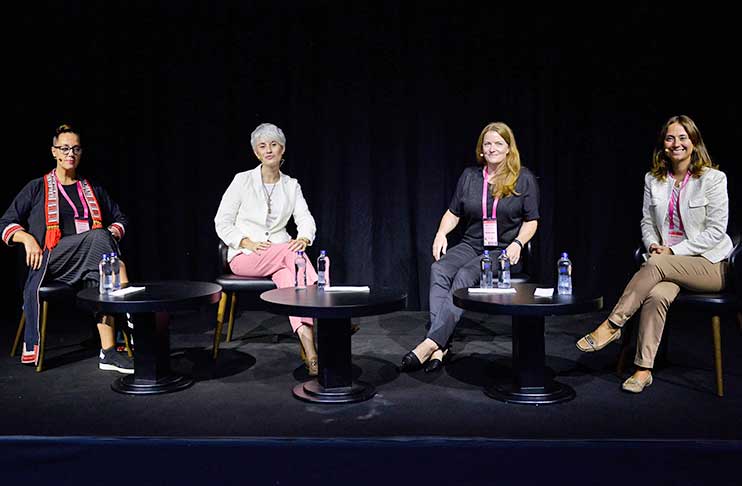
Lenzing, one of the main sponsors of Mercedes-Benz Fashion Week Istanbul (MBFWI), once again demonstrated their commitment to this issue through the Sustainability Panel. Attended by the movers and shakers of the industry, the panel attracted great attention.
Lenzing Group produces cellulose fibers from renewable semi-naturalwood with eco-conscious production processes, and showed their commitment to sustainability in the Turkish textile and fashion industry. One of the main sponsors of Mercedes-Benz Fashion Week Istanbul (MBFWI) which took place between 11th and 14th September, Lenzing organized a Sustainability Panel as part of the fashion week. Moderated by the Brand AmbassadorFerhan İstanbullu, Lenzing Turkey, Middle East and Africa Business Development and Marketing Manager Hale Saraçoğlu, Amanda Johnston from the The Sustainable Angle team and Simone Seisl from Textile Exchange took part as a speaker at the panel. The panel was followed by an intense audience from textile, apparel, fashion and design industries.
Sustainability Panel, Hale Saraçoğlu: Lenzing is one of the most sustainable companies of the industry
Lenzing Turkey, Middle East and Africa Business Development and Marketing Manager Hale Saraçoğlu said that one of the main strategies of the company is sustainability. Voicing the textile industry produces about 100 million tons of fibers annually. “Roughly 60% of this is synthetic, 20% cotton and 6.2% of it is cellulosic fibers produced from wood based renewable raw materials”. Stating that Lenzing produces viscose, modal and lyocell fiber types on a commercial scale, Saraçoğlu underlined that they are acting with environment-friendly principles in the process of raw material procurement and production in line with their sustainability strategies. Saraçoğlu continued her words as follows;
“The roof brand for lyocell and modal fibers we produce is TENCEL™ and one of our brand promises is sustainable production. Lenzing produces with very high environmental standards and sustainable management principles. Our fibers biodegrade in the soil and in the sea and can return back to the nature. As one of the most sustainable companies in the industry, we have proved our commitment with a large number of international sustainability certificates that we have obtained for our business processes.”
Amanda Johnston: consumers must read the labels during shopping
Amanda Johnston of The Sustainable Angle; non-profit organization which works to contribute to the minimization of environmental impacts in the production process; spoke at the panel. Johnston noted that it is needed to act without wasting time about the world’s resources.
“Nowadays, consumers are doing textile shopping unconsciously” said Johnston, and continued saying; “However, if the consumers read the label of the product they bought; where the fabric came from, what raw material it was made from and the conditions under which it was made; they would understand the environmental impact of this process and make more informed choices. Unfortunately, we are mistreating the world we live in. We are consuming as it will not end, but we cannot continue. We are at a point to worry about the world’s resources, and therefore we need to take action without delay.”
Simone Seisl: transformation will take place step by step
Simone Seisl from Textile Exchange, a nonprofit organization that aims for sustainability in textile production; pointed out that everyone, from producers to consumers, have responsibilities. Stressing that the change will take place step by step; Seisl said that everyone is on the same ship for an important issue like global climate change; and there is no luxury to blame it on someone else.
Seisl; “Of course we don’t expect anyone to change at a moment’s notice, but starting today we must initiate this movement. For example, we all know how down feather production has damaged animals in some cases. As Textile Exchange, we have increased the amount of birds that have not been damaged in this way; to 550 million in the last two years working with 80 brands; by playing a role in improving the conditions in which birds are kept and making them harmless. This is a great success.”
Simone Seisl also recalled that Turkey is one of the most important global players in the denim production; and underlined that he believes that much more successful work will be accomplished in future years for denim recycling.
Lenzing did not attract attention only with the Sustainability Panel during the fashion week. Meltem Özbek and Giray Sepin’s Spring / Summer 2019 collections prepared with the fabrics produced by the company’s TENCEL™ branded fibers won great acclaim from the fashion lovers.


